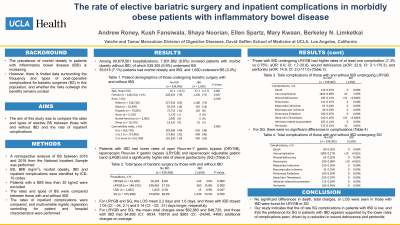Monday Poster Session
Category: Obesity
P2611 - The Rate of Bariatric Surgery and Its Inpatient Complications in Morbidly Obese Patients with Inflammatory Bowel Disease
Monday, October 23, 2023
10:30 AM - 4:15 PM PT
Location: Exhibit Hall

Has Audio
- AR
Andrew R. Roney, BA
UCLA
Los Angeles, California
Presenting Author(s)
Andrew R. Roney, BA, Kush Fansiwala, MD, Shaya Noorian, MD, Ellen J. Spartz, MD, Mary Kwaan, MD, MPH, Berkeley Limketkai, MD, PhD
UCLA, Los Angeles, CA
Introduction: The prevalence of morbid obesity in patients with inflammatory bowel disease (IBD) is increasing, but there is limited data surrounding the frequency and types of post-operative complications for bariatric surgeries (BS) in this population, contributing to procedural hesitancy.
Methods: We conducted a retrospective analysis using data from the National Inpatient Sample to identify adult patients who were hospitalized for BS between 2016 and 2018. BS, IBD and inpatient complications were identified based on ICD-10 codes (Table 1). The rates and types of BS were compared between those with and without IBD. The rates of inpatient complications and having at least one complication were compared, and where able, multivariable logistic regressions controlling for patient and hospital characteristics were performed.
Results: Among 90,879,561 adult hospitalizations from 2016-2018, 7,801,862 (8.6%) involved patients with morbid obesity and no IBD, and 514,650 (6.6%) underwent BS. 55,615 (7.1%) patients had morbid obesity and IBD, and 1,435 underwent BS (2.6%). Compared to those without, patients with IBD had similar rates of open Roux-en-Y gastric bypass (ORYGB) (~1%; n=20; p=0.328) and laparoscopic adjustable gastric band (LAGB) (< 1%; n=10; p=0.206), a significantly lower rate of laparoscopic Roux-en-Y gastric bypass (LRYGB) (14% vs 27%; n=205; p< 0.001), and a significantly higher rate of sleeve gastrectomy (SG) (84% vs 72%; n=1,200; p< 0.001).
Comparing those with and without IBD undergoing LRYGB, those with IBD had significantly higher rates of at least one inpatient complication (7.32% vs 0.75%; aOR: 7.1; CI: 1.8-27.8), wound dehiscence (2.44% vs 0.1%; aOR: 22.9; CI: 3.1-170.3), and peritonitis (4.88% vs. 0.19%; aOR: 25.3; CI: 6.0-105.8). Similar outcomes were not seen for SG. SG also had 5 cases of pneumonia compared to 0 for LRYGB. For both LRYGB and SG, the rates of other complications were lower when comparing those with IBD to those without (Table 1).
Discussion: Our study indicates that the of rate SG complications in patients with IBD is low, and that the decision to preferentially choose SG appears supported by the lower rates of complications seen, driven by a reduction in wound dehiscence and peritonitis. Although the number of cases limited our ability to statistically detect differences in some outcomes, we speculate that the incidence of major inpatient complications associated with BS is low given we found no cases of many major adverse outcomes.
Disclosures:
Andrew R. Roney, BA, Kush Fansiwala, MD, Shaya Noorian, MD, Ellen J. Spartz, MD, Mary Kwaan, MD, MPH, Berkeley Limketkai, MD, PhD. P2611 - The Rate of Bariatric Surgery and Its Inpatient Complications in Morbidly Obese Patients with Inflammatory Bowel Disease, ACG 2023 Annual Scientific Meeting Abstracts. Vancouver, BC, Canada: American College of Gastroenterology.
UCLA, Los Angeles, CA
Introduction: The prevalence of morbid obesity in patients with inflammatory bowel disease (IBD) is increasing, but there is limited data surrounding the frequency and types of post-operative complications for bariatric surgeries (BS) in this population, contributing to procedural hesitancy.
Methods: We conducted a retrospective analysis using data from the National Inpatient Sample to identify adult patients who were hospitalized for BS between 2016 and 2018. BS, IBD and inpatient complications were identified based on ICD-10 codes (Table 1). The rates and types of BS were compared between those with and without IBD. The rates of inpatient complications and having at least one complication were compared, and where able, multivariable logistic regressions controlling for patient and hospital characteristics were performed.
Results: Among 90,879,561 adult hospitalizations from 2016-2018, 7,801,862 (8.6%) involved patients with morbid obesity and no IBD, and 514,650 (6.6%) underwent BS. 55,615 (7.1%) patients had morbid obesity and IBD, and 1,435 underwent BS (2.6%). Compared to those without, patients with IBD had similar rates of open Roux-en-Y gastric bypass (ORYGB) (~1%; n=20; p=0.328) and laparoscopic adjustable gastric band (LAGB) (< 1%; n=10; p=0.206), a significantly lower rate of laparoscopic Roux-en-Y gastric bypass (LRYGB) (14% vs 27%; n=205; p< 0.001), and a significantly higher rate of sleeve gastrectomy (SG) (84% vs 72%; n=1,200; p< 0.001).
Comparing those with and without IBD undergoing LRYGB, those with IBD had significantly higher rates of at least one inpatient complication (7.32% vs 0.75%; aOR: 7.1; CI: 1.8-27.8), wound dehiscence (2.44% vs 0.1%; aOR: 22.9; CI: 3.1-170.3), and peritonitis (4.88% vs. 0.19%; aOR: 25.3; CI: 6.0-105.8). Similar outcomes were not seen for SG. SG also had 5 cases of pneumonia compared to 0 for LRYGB. For both LRYGB and SG, the rates of other complications were lower when comparing those with IBD to those without (Table 1).
Discussion: Our study indicates that the of rate SG complications in patients with IBD is low, and that the decision to preferentially choose SG appears supported by the lower rates of complications seen, driven by a reduction in wound dehiscence and peritonitis. Although the number of cases limited our ability to statistically detect differences in some outcomes, we speculate that the incidence of major inpatient complications associated with BS is low given we found no cases of many major adverse outcomes.
Disclosures:
Andrew Roney indicated no relevant financial relationships.
Kush Fansiwala indicated no relevant financial relationships.
Shaya Noorian indicated no relevant financial relationships.
Ellen Spartz indicated no relevant financial relationships.
Mary Kwaan indicated no relevant financial relationships.
Berkeley Limketkai: Azora Therapeutics – Consultant, Stock-privately held company.
Andrew R. Roney, BA, Kush Fansiwala, MD, Shaya Noorian, MD, Ellen J. Spartz, MD, Mary Kwaan, MD, MPH, Berkeley Limketkai, MD, PhD. P2611 - The Rate of Bariatric Surgery and Its Inpatient Complications in Morbidly Obese Patients with Inflammatory Bowel Disease, ACG 2023 Annual Scientific Meeting Abstracts. Vancouver, BC, Canada: American College of Gastroenterology.

